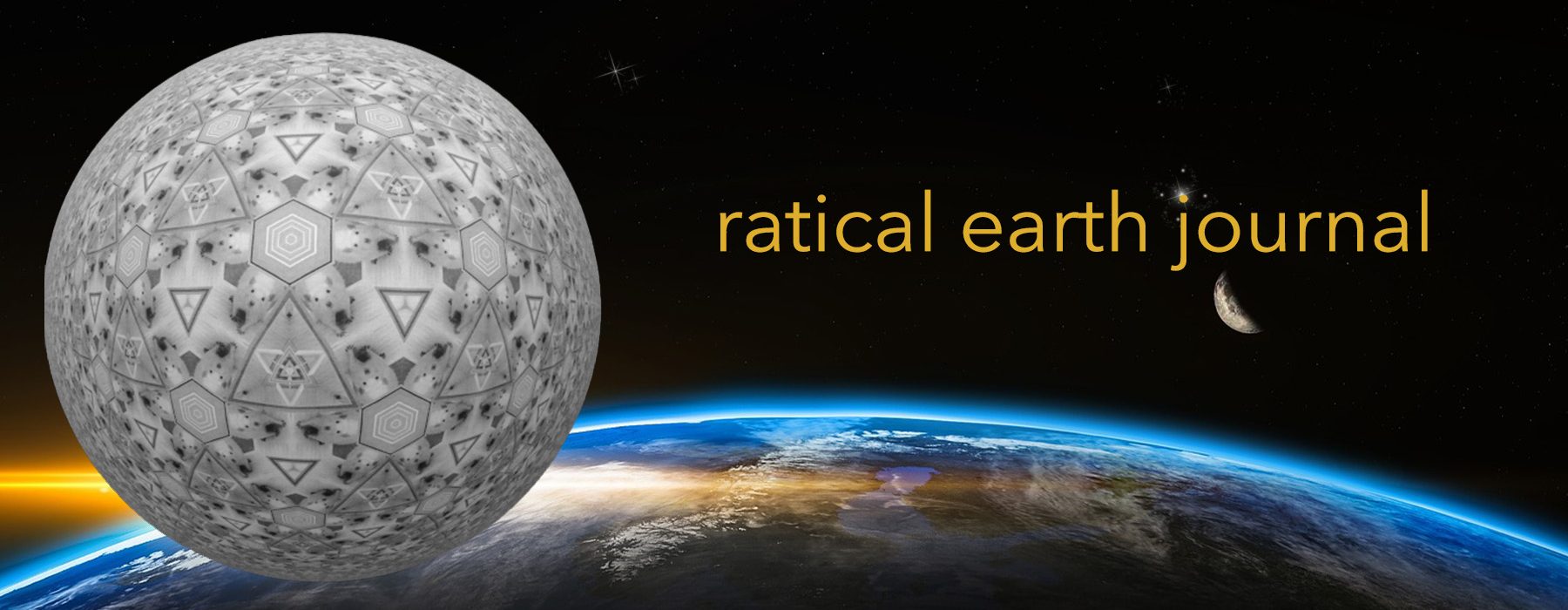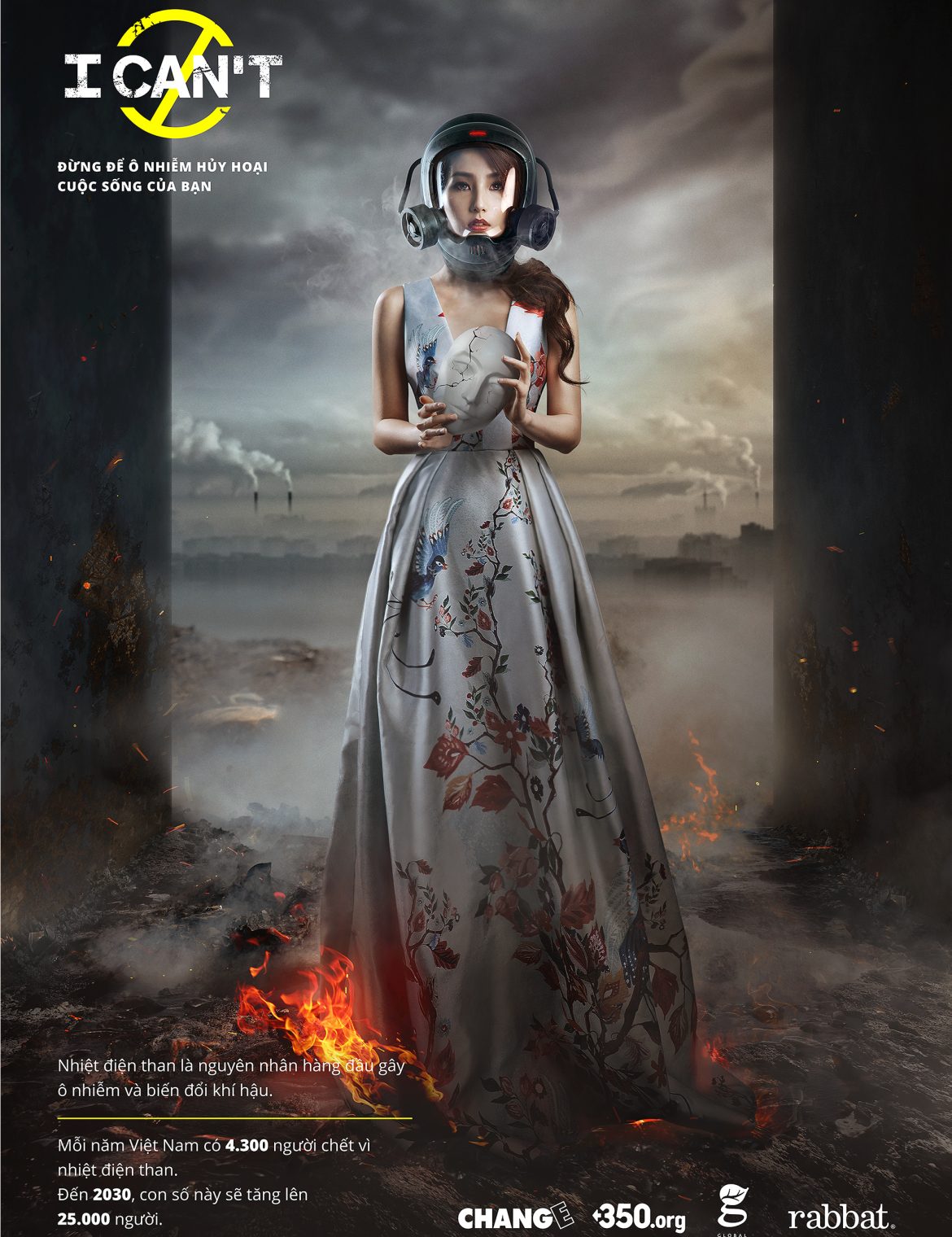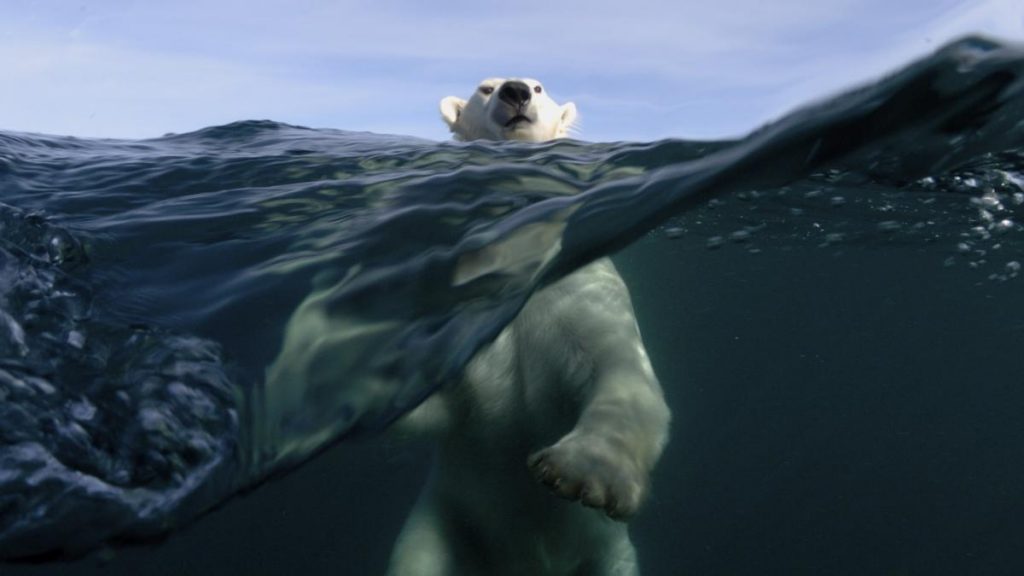ABOVE: Actress Diem My: image of an actress unable to continue acting in a world in ruins. See “Vietnamese campaign warns of nightmarish coal future” and “I CAN”T – Raise environmental awareness.”
Does the “modern” segment of our species
possess sufficient collective intelligence
to avert sleepwalking to extinction?
Carl Jung called dreams our most personal letter from our selves to our selves. Nightmares call forth images and feelings difficult to resolve and integrate in our waking time. In this bursting-at-the-seams historical moment, we face a staggering array of man-made nightmares from which, to paraphrase the parable, it would seem easier for a camel to pass through the eye of a needle than for any one of these soul crushing terminal threats to be truly resolved, rendered inert, and of no further consequence.
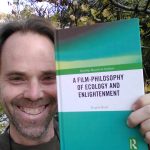
Learning about eXtinction Rebellion, while writing the Coda to the breakdown/breakthru piece earlier this Spring, I felt the most affinity with Rupert Read. (See below transcript of the beginning of the first talk I heard him give from February 6 at the University of East Anglia.) Last November he wrote a short piece called A dream of now and described having “a remarkable dream (nightmare) recently,” while writing a new book called A Film-Philosophy of Ecology and Enlightenment, which “reflects the reality through which we are sleepwalking to collective self-destruction.”
In the dream, people were glued to screens watching … a film about an impending/unfolding disaster. Some viewers dimly realised that the film was true, was in real-time, and was about their actual lives, their actual world. Some people found themselves dragged away from the screen-addiction when they realised that it was true: the dream was reality, and the calamity was fast coming to engulf them. What the calamity in fact was, as it was starting to be experienced, was lots of people driven to despair by societal breakdown produced by ecological disaster turning on each other and on their richer neighbours. Our heads were rudely jerked away from the screens we were fixed to by the spectre of hordes of desperate violent people charging our way. We then started peeling away and running ourselves. In some of our minds, we hunted rapidly for solutions—but it was too late, evidently. The time to have solved the crisis was a lot earlier, when we had the resources to do it, when we weren’t reduced to a state of preying on others or running away in fear of being preyed upon. Back then, we were caught up simply in watching the screen, and we did not act … [emphasis added]
My dream struck me as a nuanced rendition of exactly the situation we find ourselves in. The dream I had is a warning: we need to stop this from becoming the reality. We must change the story. Otherwise … we will experience it as a collapse in our society’s capacity to help others—and then a collapse in society’s capacity to help ourselves. And we will all sink together.
Like in Plato’s allegory of the cave: let us not keep watching the shadows on the wall. Let us turn from them to exit the cave and do what needs to be done. Now. If we do not leave the cave until it is too late, then the Sun will burn us and burn our forests down and burn life up, and fires set alight by nature and by humans will consume us …
Films are shared dreams, I argue, in my book. We must dream bigger than we ever have before, at this fateful moment in history. We need to become enlightened, and to engage the collective capacity to act, before we know the future, before it is too late. That is the wonderful power human beings hold.
And that power, and how films and philosophy can dramatise and manifest it, is what my book is about. I hope you might want to read it. And to dream real with me …
Dreams are noncorruptible manifestations of absolute reality. The wisdom and intelligence expressed contains an inviolable integrity that cannot be compromised nor tainted. Guy Debord’s analysis of our Society of the Spectacle is highly germain to what we confront regarding the possible future timeline of engineering our species’ self-destruction. In his 1988 Comments he observed how “With consummate skill the spectacle organizes ignorance of what is about to happen and, immediately afterwards, the forgetting of whatever has nonetheless been understood. The more important something is, the more it is hidden.”
I became conscious of the prospect of our human family’s sleepwalking to collective self-destruction in the 1980s when I first studied nuclear weapons and power. While it’s taken too long, I now apprehend the additional existential threat of global overheat. That it is difficult (putting it mildly) to even conceive of how we can actually change the story to engage our collective capacity to act—before we know the future, before it is too late—the need has never been greater to act en masse and radically change priorities in an exceedingly short time span.
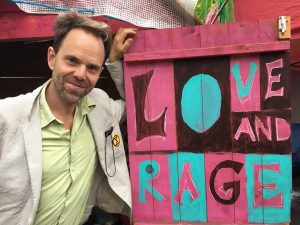
We are living a waking nightmare of supremely terrifying proportions, made much worse given so-called economic, military, and political authorities will not acknowledge the emergency and repetitively tell the truth on this one. Monetized media colludes in this sleepwaking nightmare by not producing emblazoned banner headlines across the entire width of newspaper’s front pages and broadcast channels every day, week, month, and year: that we must fundamentally alter the foundations and imperatives of our material way of life, using MUCH LESS energy, producing MUCH FEWER things if we are to avoid catastrophic mass extinction of our other than human kin as well as of ourselves—this notwithstanding the nightmarish proportions of species termination caused by our species in the current Sixth Mass Extinction ongoing. Downsizing our expectations of what we need to exist on Mother Earth will determine whether or not we can redeem the wonderful human power Rupert Read evokes above and preserve the world for the future of all Life yet unborn here.
In parallel technicolor horror the same authorities obdurately will not acknowledge the staggering implications of playing with the poison fire of nuclear weapons and power: the evil twins which, like two sides of a coin, they are forever joined. The just-published peace making pamphlet, “… not merely peace for Americans…” Banning Nuclear Weapons and Retrieving the Legacy of President Kennedy’s Last Year, does an effective job of grasping and applying the iron logic of the nuclear age. Exercising logic and intelligence with clarity and coherence, the pamphlet is an instance of the key to change course away from our system of social and ideological emphasis on death and towards an ethical and pro-evolutionary imperative of serving Life’s needs.
There are peoples on Earth who still understand the way we need to go. As Steven Newcomb (Lenape/Shawnee) expressed, speaking at the 2015 Parliament of the World’s Religions in Toward a Paradigm Change for Mother Earth – Understanding the Empire Domination Model of Christianity: A Way of Liberation: “Respect the Earth as our Mother and have a Sacred Regard for All Living Things.” Last fall I assembled a critique titled “Losing Earth? Realign with Original Free Peoples’ Great Law and Find Her Again” prompted by a New York Times Company Magazine issue wholly devoted to “climate change.” It opens with an observation by Chief Oren Lyons (Onondaga) of the wisdom we must again live by:
The law prevails, what we call the Great Law, the common law, the natural law. The law says if you poison your water, you’ll die. The law says that if you poison the air, you’ll suffer. The law says if you degrade where you live, you’ll suffer. The law says all of this. If you don’t learn that then you can only suffer. There’s no discussion with this law.
The Original Free Peoples of Mother Earth who are still here—who have survived more than five centuries of physical and cultural genocide, dispossession, and colonization—continue to practice and provide the living example of observing and following the Sacred Instructions: understanding that water and trees and animals and fish are our relatives, not resources; practicing ceremonies of thanksgiving for the life-giving energies of the Natural World and for all that we have; that all decisions made must reflect and be informed by the vital numinous awareness that all Life is sacred and that the needs of the future, of all life yet unborn, guide all choices and decisions made in the present.
In his 2019 book The Uninhabitable Earth: A Story of the Future, David Wallace-Wells writes about a climate system we have engineered “first in ignorance and then in denial” which “will remake us, transforming every aspect of the way we live—the planet no longer nurturing a dream of abundance, but a living nightmare.”
Wallace was interviewed by Paddy Woodworth who quoted him in “Goodbye, polar bears: Why climate change is much worse than you think:”
I think one of the really important things about global warming that most people, even those most engaged with it, don’t appreciate is that this is not a binary question. It’s not a matter of whether we cross the threshold of catastrophe or not. Every tick upward is going to make the planet worse, but every tick upward that we avoid is going to make the planet a healthier, safer place to live…. [I]f we made some large-scale changes immediately, we would be able to stabilise the climate at something close to what it is today. I don’t think that’s likely, though, because of all the political, social and cultural obstacles. But it is possible. So just how much further we get along the trajectory of hellishness will be entirely up to us.
The nightmare of global overheat will be further explored here on ratical earth journal. To close for now, I urge you to read the short open letter to David Wallace-Wells by Rupert Reed, John Foster, and Jem Bendell in April’s The Ecologist. The authors caution Wallace-Wells that his book’s title is ironically “too ‘optimistic’”:
Really facing up to climate reality, by contrast, means giving up all hope of solutions—without giving up on hope itself.
Instead of fantasies of one-world command-and-control salvation, we believe that The Uninhabitable Earth should wake us all up to the need for what one of us has recently and influentially named a ‘Deep Adaptation agenda’.
This involves building resilience, both physical and psychological, learning to relinquish long-held beliefs and aspirations (such as that of uninterrupted ‘progress’), and the attempted restoration of attitudes and practices which our carbon-fuelled way of life has so dangerously eroded.
Such an approach, while recognising the certainty that the civilisation which has brought us to this pass is finished, accepts also that we cannot know in advance what fine human and societal possibilities may emerge from the crucible of this very recognition.
Nightmares often jolt us from sleep into waking consciousness. Such bolts of insight, awakening, and awareness are and will be desperately needed to access any-and-all fine human and societal possibilities that may emerge from the crucible of this utterly real and deepening nightmare. Two movements showing the way we must go if effecting societal transformation towards genuinely serving Life’s needs takes place are eXtinction Rebellion and School Strike for the Climate [1] [2] [3]. Increasingly massive, global non-violent resistance and non-cooperation will be necessary and essential to address the ecological emergency we are daily sinking evermore deeply into.
Everyone has choice
When to or not to raise their voices
It’s you that decides
George Harrison (1970)
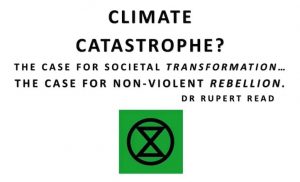 Dr. Rupert Read’s talk on “Climate Catastrophe? The Case For Societal Transformation… The Case For Non-Violent Revolution” (1:16:19)—video or mp3 (73MB)—took place on February 6, 2019 at the University of East Anglia where he teaches. The following transcript of the first 3+ minutes provides an introduction to the context of what is then explored. (See also: Time of Useful Consciousness Radio two-part broadcast—Parts I and II (29 mins each)—highlighting segments of this talk.) This event took place 3 months after “A dream of now” was published. It is a clear amplification of Rupert Read’s exploration of his insightful nightmare and contains a wealth of compelling, thought-provoking considerations of where we, our entire single human family, is now at in our species’ evolutionary timeline here on Mother Earth.
Dr. Rupert Read’s talk on “Climate Catastrophe? The Case For Societal Transformation… The Case For Non-Violent Revolution” (1:16:19)—video or mp3 (73MB)—took place on February 6, 2019 at the University of East Anglia where he teaches. The following transcript of the first 3+ minutes provides an introduction to the context of what is then explored. (See also: Time of Useful Consciousness Radio two-part broadcast—Parts I and II (29 mins each)—highlighting segments of this talk.) This event took place 3 months after “A dream of now” was published. It is a clear amplification of Rupert Read’s exploration of his insightful nightmare and contains a wealth of compelling, thought-provoking considerations of where we, our entire single human family, is now at in our species’ evolutionary timeline here on Mother Earth.
Let me start by telling you a story of a species that was asleep and when it woke up it saw the doom that it had created already for so many other species and that it had now trapped itself on a path, towards a path, of self-imposed death. It saw its own doom and it trembled in fear and it wept.
But then it realized that it wasn’t fully awake yet. There was a further step it had to take to become awakened, to become enlightened. And that was to realize, ‘Hang on a minute. We’re not spectators of this. This story isn’t over yet. It’s wrong to tell it as if it’s over. We can rebel against this doom, against this path to extinction. If we see clearly what we’ve done, the state we’re in, the path ahead, the doom that seems inevitable, well, that seeing is the beginning of the one and only way in which it might yet not be inevitable.
Because we’re not spectators. We are agents. We are potential agents of change and we have no idea what we are capable of until we try. We can rebel against the very predictable results of our present path. If we dare to look the reality of what we’ve done to Life on Earth, and what we’ve done to our very climate, in the face, then, two things.
Firstly we can prepare for our possible doom. And if we’re potentially going to fail to prevent that doom, as looks objectively probable, then we’d better get on with preparing to meet it. And Secondly, we can prepare ourselves to seek to give our all to prevent it.
This talk is about those two kinds of preparations: about adaptation to a possible coming fate and about the heroic attempt to prevent that fate.
This talk is about how it looks like we’re doomed. But also about how it only looks like that only if we only look, if we picture ourselves as spectators.
But if instead we step into our full power as agents of change, capable of extraordinary, beautiful, unprecedented, unknowable things, then objective assessment of probabilities suddenly all becomes moot. And instead it’s about our freedom to create something new, something historic, something glorious right in the teeth of the darkness of this time.
